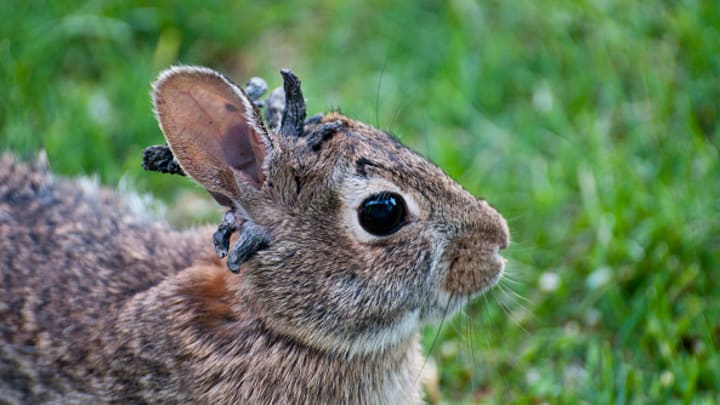Colorado residents have spotted rabbits with weird, gnarled growths on their heads recently, leading to widespread concern. Here’s what to know about the infection plaguing the animals and whether it poses a threat to them or to people nearby.
What’s Going on With These Rabbits?

Images of rabbits with black, tentacle-like structures have been circulating on social media. According to The Washington Post, northern Colorado residents, especially those in Fort Collins, have spotted the animals wandering around. Additionally, Colorado Parks and Wildlife, a state agency, has received many reports about the strange-looking rabbits.
Scientists attribute the frightening masses to the Shope papillomavirus (or the cottontail rabbit papillomavirus), spread by tick or insect bites. Richard Shope first described the virus in the 1930s after he came across infected cottontail rabbits in Kansas and Iowa. The infection causes horn-shaped warts made of keratin, the same naturally occurring protein that forms your hair, nails, and skin. The most recent images show the growths on the animals’ head and neck, but they can appear on other areas like the ears, shoulders, and abdomen.
You May Also Like:
- 10 Strange Creatures That Prowl the Pages of Medieval Bestiaries
- 11 Facts About the Animals of Chernobyl
- 8 Seemingly Harmless Plants That Can Kill or Maim You
The scary viral infection is eerily reminiscent of the nightmare-inducing parasites in The Last of Us and The Thing (1982). That said, the virus cannot be transmitted to humans. Moreover, the infected rabbits are not considered to be in danger unless the growths grow around an animal’s mouth and prevent them from eating or drinking. The unsightly masses typically go away on their own after the rabbit fights off the infection. Most of these diseased rabbits can survive it.
The Shope papillomavirus poses a greater threat to domesticated rabbits than to their wild counterparts, according to Snopes. This is because the growths are three times more likely to become cancerous in pet rabbits. However, the masses can be surgically removed by a vet. Colorado Parks and Wildlife warns that pet rabbits kept outside are at a higher risk due to bug bites and interactions with wild rabbits.
Read More About Animals:
